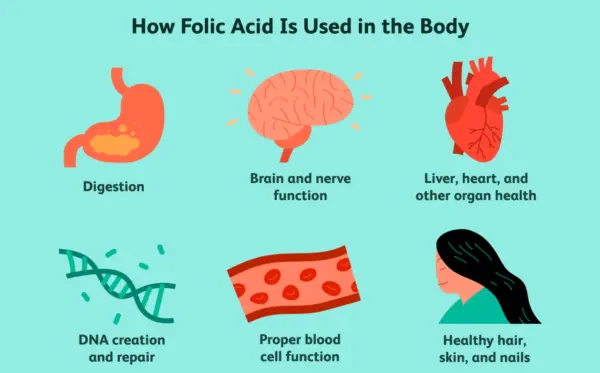Folic Acid and Its Health Benefits

Last edited, 7 February 2025
It can be difficult to maintain a balance of vitamins and minerals in our bodies. This is especially true if you don’t know what quantities and food sources to consume daily to ensure optimal levels of vitamins and minerals. Vitamins and minerals are an extremely critical part of our bodies, and maintaining a balance of them is not always easy.
It is for this exact reason that our team spends so much time researching vitamins and minerals and providing you with all the information that you need to maintain a healthy body. Recently, we talked about the importance of magnesium, NAD, and resveratrol. We’ve researched the purpose of folic acid, what it is, how to understand the deficiency better, and which food sources are the best to make sure that you make the most of this vitamin.
What Is Folic Acid?
Folic acid is essentially the synthetic form of folate, which is a naturally occurring B vitamin. Folate aids in helping create DNA and other genetic material. Folic acid is also important for prenatal health, so women are encouraged to get the proper intake of folic acid while pregnant.
Folic acid, or folate, is known as vitamin B9, which is water-soluble and occurs naturally in certain foods. It is frequently added to fortified foods and vitamin supplements. Apart from helping form DNA, folic acid also helps form RNA and is involved in protein metabolism. Folic acid plays a key role in breaking down homocysteine, which is an amino acid that, in high concentrations, exerts harmful effects on the body, but we will discuss this in more detail later on in this blog post. Mood regulation and depression can be affected by vitamin B9 due to its role in serotonin and dopamine synthesis. Additionally, folate is needed for the production of healthy blood cells and is critical during periods of rapid growth, in particular during pregnancy and foetal development.
An interesting occurrence happens when there is a high intake of folic acid, as it can often mask a vitamin B12 deficiency, which needs to be tested as it could lead to neurological effects that may become irreversible. Usually, this can be remedied by taking a supplement that has 100% of the daily value of both folic acid and vitamin B12.

Folate Deficiency and Its Consequences
More often than not, people can experience folate deficiency without even knowing it. In order to keep your health in top shape, it is important to understand the symptoms, causes, and effects of folate deficiency.
A folate deficiency occurs when there is not enough folate present in the body. Oftentimes, this can lead to a type of anaemia called megaloblastic anaemia, which is a blood disorder that occurs when the bone marrow produces stem cells that create abnormally large blood cells. It can also result in an iron deficiency, however, iron also needs copper in order to be absorbed properly. Some foods that are rich in copper include oysters, liver, lentils, and dark chocolate.
Do You Have a B9 Deficiency?
Deficiencies in folic acid can be detected by a blood screening and urine test. There is a need to keep in mind that vitamin B9 deficiency cannot exist alone and is usually accompanied by other deficiencies as well, for example, vitamin B12, copper, zinc, and manganese. Additionally, elevated levels of homocysteine (tHcy) and methylmalonic acid (MMA) are very likely to be present. Measurement of these metabolites can be used to screen for functional folate and vitamin B-12 deficiencies. Hence, tHcy and MMA should be measured if folate is suspected to be deficient. In general, lab tests are secondary to a thorough clinical examination and symptoms.
Common Symptoms of Folate Deficiency:
- Fatigue
- Low energy
- Difficulty concentrating
- Frequent headaches
- Frequent irritability
- Heart palpitations
- Sores inside the mouth or on the tongue
- Change of colour on the skin or fingernails
- Muscle aches and weakness
- Hair loss
- Bleeding gums
- Poor memory
- Dizziness
- Difficulty breathing or shortness of breath
- Easy bruising
- Problems with understanding, comprehending and judgement
- Problems with nervous system
- Depression and anxiety
- Temporary infertility
- Poor appetite
- Atherosclerotic lesions
Individuals with an Increased Risk of Folate Deficiency:
- Alcoholically dependent individuals
- Pregnant women
- Individuals of childbearing age
- Individuals with conditions that affect nutrient absorption, including irritable bowel disorder (IBD) and celiac disease
- MTHFR polymorphism – a genetic condition that impairs the ability to convert folate to its active form
- Individuals how have undergone a colon surgery
- Individuals with malabsorptive disorders
We need to be aware that folate is absorbed throughout the entire colon. Folate and other vitamins and minerals may not be absorbed in optimal amounts if your intestines have any problems, such as malabsorption, perforation, or other medical conditions.

Hi! I’m Alona, your expert in beauty and long-lasting vitality, especially when it pertains to hair health.
If you have questions about our hair growth product line, or would like to book a free consultation, our specialists are here to help!
- we are online
Recommended Folic Acid Intake
Fortified foods and supplements typically contain more folic acid than regular foods. However, it is important to understand how much folic acid is needed for different genders and age groups. Therefore, we’ve tabulated the recommended dosage of dietary folate equivalent (DFE) for all ages below.
| Age | Recommended DFE Dosage |
| 0–6 months | 65 mcg |
| 7–12 months | 80 mcg |
| 1–3 years | 150 mcg |
| 4–8 years | 200 mcg |
| 9–13 years | 300 mcg |
| 14–18 years | 400 mcg |
| 19+ years | 400 mcg |
| During pregnancy | 400–800 mcg |
| During lactation | 500 mcg |
Natural Sources of Folic Acid
Although folic acid is present in dietary supplements and fortified foods, there are also many natural foods that can be great sources of folic acid. See what some of them are below.
| Food Source | mcg DFE per serving | Percent DV* |
| Beef liver | 215 | 54 |
| Spinach | 131 | 33 |
| Fortified breakfast cereal | 100 | 25 |
| White rice | 90 | 22 |
| Asparagus | 89 | 22 |
| Brussels sprouts | 78 | 20 |
| Romaine lettuce | 64 | 16 |
| Avocado | 59 | 15 |
| Broccoli | 52 | 13 |
| Mustard greens | 52 | 13 |
| Bread | 50 | 13 |
| Green peas | 47 | 12 |
| Kidney beans | 46 | 12 |
| Tomato juice | 36 | 9 |
| Orange juice | 35 | 9 |
| Papaya | 27 | 7 |
| Bananas | 24 | 6 |
| Turnip greens | 32 | 8 |
| Peanuts | 27 | 7 |
| Eggs | 22 | 6 |
| Milk | 12 | 3 |
Who Should Take Folic Acid?
Blood screenings do not usually test for folic acid levels, so there are many of us who are unaware of whether or not our bodies have adequate levels of the substance. Folic acid deficiency isn’t common in normal circumstances. However, there are several factors that can cause levels to drop, which is why some people would benefit from a higher intake of folic acid.
Pregnancy
Interestingly, the spinal cord is one of the first parts of the body to form in an embryo. If the pregnant person has low folic acid levels, this could possibly lead to spinal cord irregularities during foetal development.
Similarly, low folic acid levels can also lead to neural tube irregularities such as spina bifida (a condition that becomes available at birth and affects the spine) and anencephaly (a serious birth condition where a baby is born without parts of its brain or skull). The neural tube is what forms the embryo’s early brain and spine.
Additionally, proper levels of folic acid may also reduce the risks of preterm birth, heart irregularities, and cleft palate. Typically, people who are pregnant or might become pregnant are recommended to take between 400 and 800 micrograms (mcg) of folic acid per day.
Cardiovascular Disease
The high levels of homocysteine in your body can have detrimental effects on the functioning of your body, including damaging the inner blood vessels that cause clogging and increase the risk of heart attacks, strokes, and other cardiovascular diseases. Furthermore, folic acid, as well as all B group vitamins, is involved in homocysteine metabolism, decreasing its levels. Folic acid doesn’t cure cardiovascular conditions directly but it is clinically proven that supplementation significantly lowers the risk of having a stroke by 25%.
Mood Disorders
Folic acid levels can also have a serious influence on an individual’s mood. For example, people with low levels of folate are more likely to experience depression. According to research, as many as 30% of severely depressed patients are actually experiencing a folate deficiency.
In general, it is believed that folic acid supplements or fortified foods can improve mood levels and concentration levels despite additional research being needed to pinpoint the exact effects of low folate levels.
Autism Spectrum Disorder
Although the research is not entirely conclusive yet, some studies have shown that taking folic acid before and during early pregnancy could reduce the baby’s chance of developing autism spectrum disorder (ASD).
According to research, taking at least 400 mcg of folic acid from both supplements and natural food sources while pregnant was associated with a reduced chance of the baby developing ASD.
Who Should Not Take Folic Acid?
The presence of folate in the body is generally beneficial, but certain medications that treat specific conditions can interact with folate and reduce the effectiveness of the medication. People with the following conditions should not generally take folic acid:
- Undergoing kidney dialysis
- Epilepsy
- Type 2 diabetes
- Rheumatoid arthritis
- Lupus
- Inflammatory bowel disease (IBD)
- Celiac disease
Are There Side Effects of Folic Acid?
Based on research, medical professionals have come to a consensus that there are no serious side effects associated with taking too much folic acid unless it directly tempers with the use of certain medications. Because folic acid is water soluble, any excess of folic acid would naturally pass through the urine. However, there are some rare cases where some people have reported having an upset stomach as a result of taking too much folic acid.
Alternatives to Folic Acid Supplements
Folic acid can be substituted if a person experiences any negative effects. Some evidence suggests that taking supplements containing L-5-Methyltetrahydrofolate, which is the active form of folate or folic acid, can have the same benefits. For example, this alternative to folic acid could be especially beneficial for people who are taking medication that negatively interacts with folate or folic acid.
Conclusion
Folic acid is the synthetic form of folate, which our bodies need to function properly and stay healthy. Usually, people get enough folate from natural food sources, however, folic acid is 100% bioavailable, while natural food sources have only about 85% bioavailability.
- we are online
Schedule For Later
Sources & expertise
We have used the following sources to compile this page:
Information checked by an expert

Alona Arel
The information on this page is checked by Alona Arel. She’s an expert on beauty and longevity and often asked to share her knowledge. For example for Healthline and Lifehacker.
Awards & accreditations



IdealofMeD Hair Transplant
We’re you’re number 1 destination for a hair transplant in Turkey. We have a holistic approach when working with hair loss and longevity, and we have developed our own products. You can find them in the IdealofMeD Shop.
